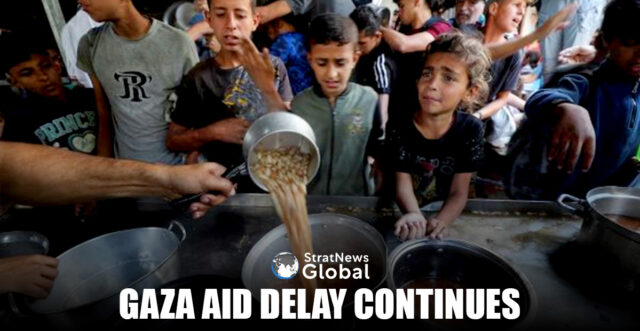Despite increasing international and internal pressure on the Israeli government, Palestinians in Gaza were still awaiting the promised aid and food deliveries on Wednesday, as the population faces a severe risk of famine following an 11-week blockade.
Fewer than 100 aid trucks have entered Gaza, according to Israeli military figures, since Monday, when Prime Minister Benjamin Netanyahu‘s government agreed to lift the blockade that has forced Gazans into a desperate struggle to survive.
With air strikes and tank fire continuing to pound the enclave, killing dozens of people on Wednesday, local bakers and transport operators said they had yet to see fresh supplies of flour and other essentials.
Abdel-Nasser Al-Ajramy, the head of the bakery owners’ society, said at least 25 bakeries that were told they would receive flour from the World Food Programme had seen nothing and there was no relief from the hunger for people waiting for food.
“There is no flour, no food, no water,” said Sabah Warsh Agha, a 67-year-old woman from the northern Gaza town of Beit Lahiya sheltering in a cluster of tents near to the beach in Gaza City. “We used to get water from the pump, now the pump has stopped working. There is no diesel or gas.”
The resumption of the assault on Gaza since March, following a two-month ceasefire, has drawn condemnation from countries that have long been cautious about expressing open criticism of Israel. Even the United States, the country’s most important ally, has shown signs of losing patience with Netanyahu.
Britain has suspended talks with Israel on a free trade deal, and the European Union said it will review a pact on political and economic ties over the “catastrophic situation” in Gaza. Britain, France and Canada have threatened “concrete actions” if Israel continues its offensive.
‘Pariah State’
Within Israel, left-wing opposition leader Yair Golan drew a furious response from the government and its supporters this week when he declared that “A sane country doesn’t kill babies as a hobby” and said Israel risked becoming a “pariah state among the nations.”
Golan, a former deputy commander of the Israeli military who went single-handedly to rescue victims of the Hamas attack on Israel on Oct 7, 2023, leads a party with little electoral clout.
But his words, and similar comments by former Prime Minister Ehud Olmert in an interview with the BBC, underscored the deepening unease in Israel at the continuation of the war while 58 hostages remain in Gaza. Netanyahu dismissed the criticism.
“I heard Olmert and Yair Golan – and it’s shocking,” he said in a videoed statement. “While IDF soldiers are fighting Hamas, there are those who are strengthening the false propaganda against the State of Israel.”
Opinion polls show widespread support for a ceasefire that would include the return of all the hostages, with a survey from the Hebrew University of Jerusalem this week showing 70% in favour of a deal.
War In Gaza To Continue?
But hardliners in the cabinet, some of whom argue for the complete expulsion of all Palestinians from Gaza, have insisted on continuing the war until “final victory”, which would include disarming Hamas as well as the return of the hostages.
Netanyahu, trailing in the opinion polls and facing trial at home on corruption charges which he denies as well as an arrest warrant from the International Criminal Court has so far sided with the hardliners.
Air strikes and tank fire killed at least 34 people across the Gaza Strip on Wednesday, Palestinian health authorities said. The Israeli military said air strikes hit 115 targets, which it said included rocket launchers, tunnels and unspecified military infrastructure.
As some trucks left Kerem Shalom, the sprawling customs and logistics hub at the south-eastern corner of the Gaza Strip, a small group of Israeli protestors angry that any supplies were being let into Gaza while hostages were still held there tried to block them.
Israel imposed the blockade at the beginning of March, saying Hamas was seizing supplies meant for civilians, a charge denied by the terrorist group.
A new U.S.-backed system, using private contractors, is due to begin aid distribution in Gaza in the near future but the plan has been criticized by aid groups and many key details remain unclear.
Israel launched its campaign in Gaza in response to the Hamas attack on Oct 7, which killed some 1,200 people by Israeli tallies and saw 251 hostages abducted into Gaza.
The campaign has killed more than 53,600 Palestinians, according to Gaza health authorities, and devastated the coastal strip, where aid groups say signs of severe malnutrition are widespread.
(With inputs from Reuters)





